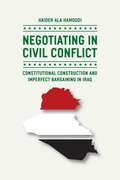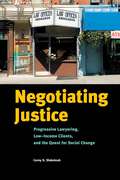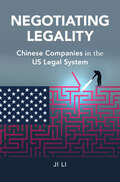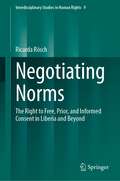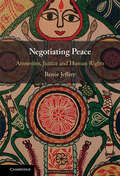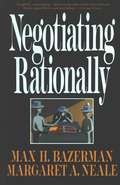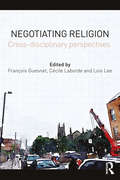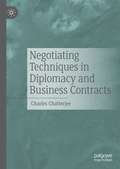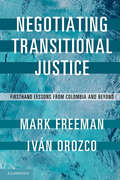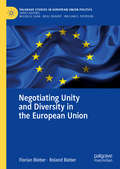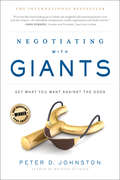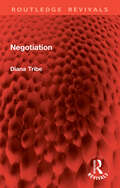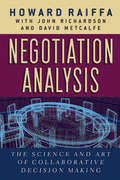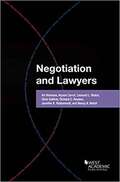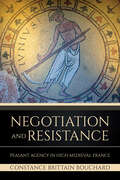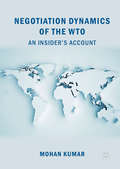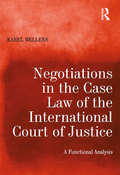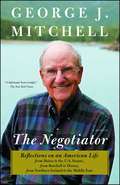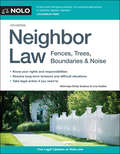- Table View
- List View
Negotiating in Civil Conflict: Constitutional Construction and Imperfect Bargaining in Iraq
by Haider Ala HamoudiIn 2005, Iraq drafted its first constitution and held the country’s first democratic election in more than fifty years. Even under ideal conditions, drafting a constitution can be a prolonged process marked by contentious debate, and conditions in Iraq are far from ideal: Iraq has long been racked by ethnic and sectarian conflict, which intensified following the American invasion and continues today. This severe division, which often erupted into violence, would not seem to bode well for the fate of democracy. So how is it that Iraq was able to surmount its sectarianism to draft a constitution that speaks to the conflicting and largely incompatible ideological view of the Sunnis, Shi’ah, and Kurds? Haider Ala Hamoudi served in 2009 as an adviser to Iraq’s Constitutional Review Committee, and he argues here that the terms of the Iraqi Constitution are sufficiently capacious to be interpreted in a variety of ways, allowing it to appeal to the country’s three main sects despite their deep disagreements. While some say that this ambiguity avoids the challenging compromises that ultimately must be made if the state is to survive, Hamoudi maintains that to force these compromises on issues of central importance to ethnic and sectarian identity would almost certainly result in the imposition of one group’s views on the others. Drawing on the original negotiating documents, he shows that this feature of the Constitution was not an act of evasion, as is sometimes thought, but a mark of its drafters’ awareness in recognizing the need to permit the groups the time necessary to develop their own methods of working with one another over time.
Negotiating Justice: Progressive Lawyering, Low-Income Clients, and the Quest for Social Change
by Corey S. ShdaimahWhile many young people become lawyers for the big bucks, others are motivated by the pursuit of social justice, seeking to help people for whom legal services are financially, socially, or politically inaccessible. These progressive lawyers often bring a considerable degree of idealism to their work, and many leave the field due to insurmountable red tape and spiraling disillusionment. But what about those who stay? And what do their clients think? Negotiating Justice explores how progressive lawyers and their clients negotiate the dissonance between personal idealism and the realities of a system that doesn’t often champion the rights of the poor.Corey S. Shdaimah draws on over fifty interviews with urban legal service lawyers and their clients to provide readers with a compelling behind-the-scenes look at how different notions of practice can present significant barriers for both clients and lawyers working with limited resources, often within a legal system that many view as fundamentally unequal or hostile. Through consideration of the central themes of progressive lawyering—autonomy, collaboration, transformation, and social change—Shdaimah presents a subtle and complex tableau of the concessions both lawyers and clients often have to make as they navigate the murky and resistant terrains of the legal system and their wider pursuits of justice and power.
Negotiating Legality: Chinese Companies in the US Legal System (Cambridge Studies in Law and Society)
by Ji LiDespite escalating geopolitical rivalry, the US and China continue to be economically intertwined. Numerous Chinese companies have made substantial investments in the US and are reluctant exit this strategically important market. While the global expansion of Chinese companies has ignited intense policy and academic debates, their interactions with complex host-state legal systems have largely escaped systematic examination. To fill this knowledge gap, Negotiating Legality introduces a dual institutional framework and applies it to analyzing extensive interviews and multi-year survey data, thereby shedding light on how Chinese companies develop in-house legal capacities, engage with US legal professionals, and navigate litigation in US courts. As the first comprehensive investigation of these crucial topics, this book is indispensable for anyone interested in China's rise, its global impacts-especially on legal systems of developed nations like the US-and the intricate dynamics of US-China relations.
Negotiating Norms: The Right to Free, Prior, and Informed Consent in Liberia and Beyond (Interdisciplinary Studies in Human Rights #9)
by Ricarda RöschThe book explores the right to free, prior and informed consent (FPIC) – a highly controversial right. It is mainly discussed in the context of large-scale business projects on Indigenous territories but also with respect to the creation of protected areas and communities’ traditional resource rights. From a legal anthropological perspective, it attempts to disentangle the various coexisting understandings of FPIC and provide an explanation for the multiplicity of FPIC norms or – to put it in other words – its fragmentation. It examines the right- or stakeholders of FPIC, the scope of the consent requirement, the respect for self-determined decision-making, and the right to FPIC of women in different sociolegal fields. Moreover, it explores the impact of power relations, strategic alliances, and discourses within these fields and shows that the emerging FPIC norms are the result of norm negotiation processes. The fields that are examined include transnational law – more specifically, human rights, environmental, and development law -, the Liberian post-conflict forest and land legislation, and Liberian community forests as fields in which FPIC is operationalized. Liberia is quite unique in this respect. It is not only one of the few countries in Africa recognizing FPIC but has also begun implementing it. The book shows that based on the logic of a sociolegal field, legal identities are discursively created and determine the meaning of FPIC. Moreover, different actors can resort to different legalities shaping the emerging FPIC norm.
Negotiating Peace: Amnesties, Justice and Human Rights
by Renée JefferyIn the past two decades, peace negotiators around the world have increasingly accepted that granting amnesties for human rights violations is no longer an acceptable bargaining tool or incentive, even when the signing of a peace agreement is at stake. While many states that previously saw sweeping amnesties as integral to their peace processes now avoid amnesties for human rights violations, this anti-amnesty turn has been conspicuously absent in Asia. In Negotiating Peace: Amnesties, Justice and Human Rights Renée Jeffery examines why peace negotiators in Asia have resisted global anti-impunity measures more fervently and successfully than their counterparts around the world. Drawing on a new global dataset of 146 peace agreements (1980–2015) and with in-depth analysis of four key cases - Timor-Leste, Aceh Indonesia, Nepal and the Philippines - Jeffery uncovers the legal, political, economic and cultural reasons for the persistent popularity of amnesties in Asian peace processes.
Negotiating Pharmaceutical Uncertainty: Women's Agency in a South African HIV Prevention Trial
by Eirik Saethre Jonathan StadlerTelling the story of a clinical trial testing an innovative gel designed to prevent women from contracting HIV, Negotiating Pharmaceutical Uncertainty provides new insight into the complex and contradictory relationship between medical researchers and their subjects. Although clinical trials attempt to control and monitor participants' bodies, Saethre and Stadler argue that the inherent uncertainty of medical testing can create unanticipated opportunities for women to exercise control over their health, sexuality, and social relationships. Combining a critical analysis of the social production of biomedical knowledge and technologies with a detailed ethnography of the lives of female South African trial participants, this book brings to light issues of economic exclusion, racial disparity, and spiritual insecurity in Johannesburg's townships. Built on a series of tales ranging from strategy sessions at the National Institutes of Health to witchcraft accusations against the trial, Negotiating Pharmaceutical Uncertainty illuminates the everyday social lives of clinical trials.As embedded anthropologists, Saethre and Stadler provide a unique and nuanced perspective of the reality of a clinical trial that is often hidden from view.
Negotiating Pharmaceutical Uncertainty: Women's Agency in a South African HIV Prevention Trial
by Eirik Saethre Jonathan StadlerTelling the story of a clinical trial testing an innovative gel designed to prevent women from contracting HIV, Negotiating Pharmaceutical Uncertainty provides new insight into the complex and contradictory relationship between medical researchers and their subjects. Although clinical trials attempt to control and monitor participants' bodies, Saethre and Stadler argue that the inherent uncertainty of medical testing can create unanticipated opportunities for women to exercise control over their health, sexuality, and social relationships. Combining a critical analysis of the social production of biomedical knowledge and technologies with a detailed ethnography of the lives of female South African trial participants, this book brings to light issues of economic exclusion, racial disparity, and spiritual insecurity in Johannesburg's townships. Built on a series of tales ranging from strategy sessions at the National Institutes of Health to witchcraft accusations against the trial, Negotiating Pharmaceutical Uncertainty illuminates the everyday social lives of clinical trials. As embedded anthropologists, Saethre and Stadler provide a unique and nuanced perspective of the reality of a clinical trial that is often hidden from view.
Negotiating Rationally
by Max H. BazermanDraws on a study of the irrational behavior of ten thousand executives and student leaders to help managers and negotiators check their personal biases and assumptions in order to reach the best agreements possible.
Negotiating Religion: Cross-disciplinary perspectives
by Cécile Laborde François Guesnet Lois LeeNegotiating religious diversity, as well as negotiating different forms and degrees of commitment to religious belief and identity, constitutes a major challenge for all societies. Recent developments such as the ‘de-secularisation’ of the world, the transformation and globalisation of religion and the attacks of September 11 have made religious claims and religious actors much more visible in the public sphere. This volume provides multiple perspectives on the processes through which religious communities create or defend their place in a given society, both in history and in our world today. Offering a critical, cross-disciplinary investigation into processes of negotiating religion and religious diversity, the contributors present new insights on the meaning and substance of negotiation itself. This volume draws on diverse historical, sociological, geographic, legal and political theoretical approaches to take a close look at the religious and political agents involved in such processes as well as the political, social and cultural context in which they take place. Its focus on the European experiences that have shaped not only the history of ‘negotiating religion’ in this region but also around the world, provides new perspectives for critical inquiries into the way in which contemporary societies engage with religion. This study will be of interest to academics, lawyers and scholars in law and religion, sociology, politics and religious history.
Negotiating State and Non-State Law: The Challenge of Global and Local Legal Pluralism (f ASIL Studies in International Legal Theory)
by Michael HelfandTrends in legal philosophy, international law, transnational law, law and religion, and political science all point toward the increasing role played by non-state law in both public and private ordering. Numerous organizations, institutions, associations, and groups have emerged alongside the nation-state, each purporting to provide their members with rules and norms to govern their conduct and organize their affairs. The nation-state increasingly finds itself sandwiched, so to speak, between two broad and contrasting categories of non-state law. The first category – law above the state – captures a wide range of legal systems that function across the territorial borders of nation-states. The second category – law below the state – includes various forms of local customary, religious, and indigenous law. Indeed, as these forms of non-state law persist and proliferate alongside the nation-state, the relationship between state and non-state law becomes more complex, multifaceted, and tense. This volume addresses this relationship between the nation-state and these various forms of non-state law, considering whether and to what extent state and non-state law can coexist and how each form of law seeks to influence as well as transform the other. Examines the relationship between state and non-state law, the extent to which they conflict, and to what extent can they work together Presents an in-depth exploration about the dynamics between the state and international/transnational law Shows how the dynamic between state and non-state law works between the state and religious/indigenous law
Negotiating Techniques in Diplomacy and Business Contracts
by Charles ChatterjeeDiplomacy is an established discipline, but it is still wearing its old garments,failing to display its capacity to deal with new unique bi-lateral and international disputes. In conformity with the provisions of Article 33 of the UN Charter, thisbook emphasises the need for current-day diplomats to have appropriate training in negotiation and conciliation techniques rather than leaving inter-state or international dispute hearings unsettled with their inevitable consequences.The book also identifies the role and effectiveness of negotiating techniques in conducting business contracts, women’s role in negotiating diplomatic and business deals, negotiating techniques in import-export trade, project finance, and syndicated loan agreements. It further discusses the UN system and diplomacy.The opinions expressed in this book are those of the author, and in no way may be attributed to the institution to which he belongs.
Negotiating the Deal
by Christopher AlcantaraThis book provides the first systematic and comprehensive analysis of the factors that explain both completed and incomplete treaty negotiations between Aboriginal groups and the federal, provincial, and territorial governments of Canada. Since 1973, groups that have never signed treaties with the Crown have been invited to negotiate what the government calls "comprehensive land claims agreements," otherwise known as modern treaties, which formally transfer jurisdiction, ownership, and title over selected lands to Aboriginal signatories. Despite their importance, not all groups have completed such agreements - a situation that is problematic not only for governments but for Aboriginal groups interested in rebuilding their communities and economies.Using in-depth interviews with Indigenous, federal, provincial, and territorial officials, Christopher Alcantara compares the experiences of four Aboriginal groups: the Kwanlin Dün First Nation (with a completed treaty) and the Kaska Nations (with incomplete negotiations) in Yukon Territory, and the Inuit (completed) and Innu (incomplete) in Newfoundland and Labrador. Based on the experiences of these groups, Alcantara argues that scholars and policymakers need to pay greater attention to the institutional framework governing treaty negotiations and, most importantly, to the active role that Aboriginal groups play in these processes.
Negotiating Transitional Justice: Firsthand Lessons from Colombia and Beyond
by Mark Freeman Iván OrozcoThe recent Colombian peace negotiations took the art and science of negotiating transitional justice to unprecedented levels of complexity. For decades, the Colombian government fought a bitter war against FARC guerrilla forces. After protracted negotiations, the two parties reached a peace deal that took account of the rights of victims. As first-hand participants in the talks, and principal advisers to the Colombia government, Mark Freeman and Iván Orozco offer a unique account of the mechanics through which accountability issues were addressed. Their many years working as scholars of war and transnational justice are brought to bear on their analysis of the decision to ensure transitional justice as part of the final deal. Drawing from this case study and other global experiences, Freeman and Orozco offer a comprehensive theoretical and practical conception of what makes the 'devil's dilemma' of negotiating peace with justice implausible but feasible.
Negotiating Unity and Diversity in the European Union (Palgrave Studies in European Union Politics)
by Florian Bieber Roland BieberThis book explores how the European Union has been responding to the challenge of diversity. In doing so, it considers the EU as a complex polity that has found novel ways for accommodating diversity. Much of the literature on the EU seeks to identify it as a unique case of cooperation between states that moves past classic international cooperation. This volume argues that in order to understand the EU’s effort in managing the diversity among its members and citizens it is more effective to look at the EU as a state. While acknowledging that the EU lacks key aspects of statehood, the authors show that looking at the EU efforts to balance diversity and unity through the lens of state policy is a fruitful way to understand the Union. Instead of conceptualising the EU as being incomparable and unique which is neither an international organisation nor a state, the book argues that EU can be understood as a polity that shares many approaches and strategies with complex and diverse states. As such, its effort to build political structures to accommodate diversity offers lessons to other such polities. The experience of the EU contributes to the understanding of how states and other polities can respond to challenges of diversity, including both the diversity of constituent units or of sub-national groups and identities.
Negotiating with Giants: Get what you want against the odds
by Peter D. JohnstonHOW DO YOU NEGOTIATE with Wal-Mart? With America's President over going to war? A pay raise from an intimidating boss? More money for a struggling start-up? Sweeping social change? Your survival if you're taken hostage by an armed killer? In this award-winning bestseller, you will travel across time through riveting, real-life David & Goliath stories uncovering the secrets and strategies of successful smaller players so you, too, can get what you want against the odds.
Negotiating With Insurance Companies
by Joseph VaccaroNegotiating With Insurance Companies Many plaintiffs' attorneys waste negotiating time by presenting information to adjusters in ways that do not resonate with them. Negotiating With Insurance Companies will teach you how to increase the size of your clients' settlements by using language, arguments and evidence that move adjusters and claims personnel. Packed with proven, practical advice culled from author Joseph L. Vaccaro's 40 years of insurance claims handling experience, this book brings you an insider's perspective on how to establish coverage, how to influence the carrier's reserves on your claim, and how to gain a tactical advantage in negotiations, mediation and litigation. Discover strategies for handling issues related to: * Personal auto claims * Commercial auto/truck claims * General liability claims * Big damages, bad liability cases * Own occupation disability income claims * Non-ERISA health insurance claims * Homeowners and commercial property losses * Bad faith
Negotiation (Routledge Revivals)
by Diana TribeFirst published in 1993, Negotiation places recent theoretical work on legal negotiation in a practical context. Negotiation skills are essential to every lawyer. Dealing chapter by chapter with planning for negotiation, verbal and non-verbal skills for the negotiator and the stages of a typical negotiation, the reader is invited to practice negotiation through an analysis of a real life negotiation transcript and a variety of case studies of increasing complexity. This is an important book for students of legal studies.
Negotiation Analysis: The Science and Art of Collaborative Decision Making
by Howard RaiffaThis masterly book substantially extends Howard Raiffa’s earlier classic, The Art and Science of Negotiation. It does so by incorporating three additional supporting strands of inquiry: individual decision analysis, judgmental decision making, and game theory. Each strand is introduced and used in analyzing negotiations. The book starts by considering how analytically minded parties can generate joint gains and distribute them equitably by negotiating with full, open, truthful exchanges. The book then examines models that disengage step by step from that ideal. It also shows how a neutral outsider (intervenor) can help all negotiators by providing joint, neutral analysis of their problem. Although analytical in its approach—building from simple hypothetical examples—the book can be understood by those with only a high school background in mathematics. It therefore will have a broad relevance for both the theory and practice of negotiation analysis as it is applied to disputes that range from those between family members, business partners, and business competitors to those involving labor and management, environmentalists and developers, and nations.
Negotiation and Lawyers (Career Guides)
by Art Hinshaw Alyson Carrel Leonard Riskin Chris Guthrie Richard Reuben Jennifer Robbennolt Nancy A. WelshNegotiation and Lawyers takes the latest scholarly thinking in negotiation and applies it to the various tasks that negotiators do in a way that negotiation practitioners will appreciate. <p><p>Written in 2020, the book is responsive to the increased role technology plays in the negotiation process due to the recent pandemic and provides important insights into the impact of racial inequity and implicit bias in negotiation. <p><p> Negotiation and Lawyers presents the core concepts, skills, and strategies for lawyers to succeed in the art of negotiation. We believe that anyone can improve their negotiating skills by utilizing research and psychology to inform a more intentional and strategic approach, which is what this book does―tailors negotiation theory to negotiation practice. <p><p>To do this, the authors move away from the prevailing method of teaching negotiation styles; they present negotiation as a process where two fundamental tasks are taking place: the creation and claiming of value. <p><p>Negotiators tend to think one task is more important than the other, and this book supports both schools of thought. No matter where one stands on this issue, improving one's ability as a negotiator requires practice in skills such as listening, framing, and perspective-taking as well as understanding how to effectively prepare for negotiation in order to make more strategic, intentional, and ethical decisions. <p><p>Furthermore, negotiators must acknowledge the impact of human factors in the process―emotions, cognitive biases, identity, perceptions, racial inequity, and implicit bias along with the non-human factors such as how to negotiate using various modes of technology. <p><p> This book presents these topics in a succinct manner and is ideal for 2-3 credit courses or shorter, intensive programs including negotiation training programs. At just under 200 pages, readers can easily absorb the core concepts while also having plenty of opportunity for deeper exploration through unique call-out boxes interspersed throughout the text as well as the traditional reflection questions in most textbooks.
Negotiation and Resistance: Peasant Agency in High Medieval France
by Constance Brittain BouchardIn Negotiation and Resistance, Constance Brittain Bouchard challenges familiar depictions of the peasantry as an undifferentiated mass of impoverished and powerless workers. Peasants in eleventh- and twelfth-century France had far more scope for action, self-determination, and resistance to oppressive treatment—that is, for agency—than they are usually credited with having. Through innovative readings of documents collected in medieval cartularies, Bouchard finds that while peasants lived hard, impoverished lives, they were able to negotiate, individually or collectively, to better their position, present cases in court, and make their own decisions about such fundamental issues as inheritance or choice of marriage partner. Negotiation and Resistance upends the received view of this period in French history as one in which lords dealt harshly and without opposition toward subservient peasants, offering numerous examples of peasants standing up for themselves.
Negotiation Dynamics of the WTO: An Insider's Account
by Mohan KumarThe book aims at informing and educating the public at large about the intricacies of the Negotiation Dynamics at the WTO. It traces the period from the launch of the Uruguay Round in 1986 to its conclusion at Marrakesh in 1994 and the subsequent entry into force of the WTO on 1 January 1995.The book shows how WTO Ministerial Conference in Seattle was doomed to fail and its failure led to “trust deficit” between the developed countries on the one hand and certain key developing and least-developed countries on the other. Thus tracing the WTO saga that began in the wake of the failure at Seattle and the difficult path that led to the launch of a new Round at Doha in November 2001.The book throws light on India’s domestic decision-making structure as well as some of the factors driving India’s negotiating stance at the WTO. It also describes the current impasse at the WTO and offers some ideas to revive an institution that is so crucial for the smooth functioning of the multilateral trading system.
Negotiations in the Case Law of the International Court of Justice: A Functional Analysis
by Karel WellensThis book examines the multifunctional role negotiations play in the jurisprudence of the International Court of Justice. Prior negotiations may be necessary to bring to the surface and clarify the legal aspects of a dispute before its submission to the ICJ. Negotiations may play a potential and parallel role during the course of the proceedings; results of negotiations may find their way into the judicial reasoning and may even form part of the basis of the judicial settlement. The Court’s judgment may require further negotiations for its implementation. A failure of this process may bring the parties back before the Court. This volume presents a detailed and critical examination of the case law of the ICJ through the prism of the functional interaction between negotiation and judicial settlement of disputes. In cases where legal interests of third States are involved this functional interaction becomes even more complex. The focus is not on the merits of each individual case, but on the Court’s contribution and clarification of this functional interplay. The systematic analysis of the Court’s jurisprudence makes this book essential reading for those involved with and studying international law and justice.
The Negotiator: A Memoir
by George J. MitchellCompelling, poignant, enlightening stories from former Senate Majority Leader George Mitchell about growing up in Maine, his years in the Senate, working to bring peace to Northern Ireland and the Middle East, and what he’s learned about the art of negotiation during every stage of his life.It’s a classic story of the American Dream. George Mitchell grew up in a working class family in Maine, experiencing firsthand the demoralizing effects of unemployment when his father was laid off from a lifelong job. But education was always a household priority, and Mitchell embraced every opportunity that came his way, eventually becoming the ranking Democrat in the Senate during the administrations of George H.W. Bush and Bill Clinton. Told with wit, frankness, and a style all his own, Senator Mitchell’s memoir reveals many insights into the art of negotiation. Mitchell looks back at his adventures in law and politics—including instrumental work on clean air and water legislation, the Iran-Contra hearings, and healthcare reform—as well as life after the Senate, from leading the successful Northern Ireland peace process, to serving as chairman of The Walt Disney Company, to heading investigations into the use of steroids in baseball and unethical activity surrounding the Olympic Games. Through it all, Senator Mitchell’s incredible stories—some hilarious, others tragic, all revealing—offer invaluable insights into critical moments in the last half-century of business, law, and politics, both domestic and international.
Neighbor Law: Fences, Trees, Boundaries & Noise
by Emily Doskow Attorney Lina Guillen AttorneyIs the noise from next door keeping you up at night? Is the view from your backyard being obstructed? Is a neighborhood business driving you crazy? Learn your rights and responsibilities with Neighbor Law, Nolo's clear-cut, comprehensive guide to the laws concerning common neighbor disputes. This popular bestseller covers: fences trees animal issues boundaries blocked views noise water issues neighborhood businesses dangers to children ("attractive nuisances") secondhand smoke and other pollutants, and drones. In plain English, Neighbor Law explains how to find applicable laws and resolve disputes without going to court. It tells you when the law is on your side and how to deal with your neighbors without creating enemies. If you must go to small claims court, you will also find all the facts you need here.
Neighbor Law: Fences, Trees, Boundaries & Noise
by Emily Doskow Lina GuillenResolve neighbor conflicts and get peace of mind Don’t let a neighborly nuisance turn into a nasty lawsuit. Learn your rights and responsibilities with Neighbor Law, the plain-English guide to the laws behind common neighbor disputes. Neighbor Law is more than a legal guide—it’s a practical book filled with tips on how to solve problems and restore good neighbor relations. Find out how to handle: noisy neighbors trees that hang over a property line blocked views unclear boundary lines high, unsightly, or deteriorating fences dangers to children (“attractive nuisances”) problems with neighboring businesses drones trespassing onto your property other common issues, like secondhand smoke, blighted property, and animal issues. The 10th edition includes updated laws and information on going to court, boundary fences, private nuisances, and much more.
